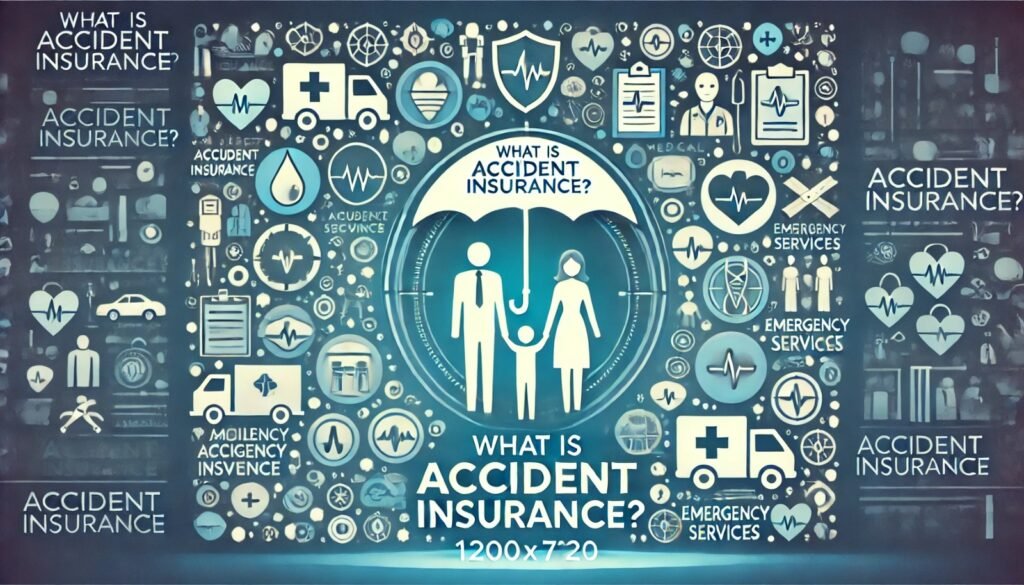In an unpredictable world, securing oneself against unforeseen events is paramount. Accident insurance serves as a financial safety net, providing coverage for injuries resulting from accidents. Unlike health insurance, which covers a broad range of medical issues, accident insurance is specifically designed to address the costs associated with accidental injuries. This includes medical expenses, hospital stays, and even rehabilitation costs.
The significance of accident insurance has grown in today’s fast-paced environment where the risk of accidents is ever-present. Whether it’s a car crash, a slip and fall, or a sports injury, accidents can happen anytime and anywhere. Having accident insurance ensures that individuals are not financially burdened during such challenging times. It provides peace of mind, knowing that one is protected against the high costs of medical care and recovery.
What is Accident Insurance?
Accident insurance is a type of insurance policy designed to provide financial protection to the policyholder in the event of an accidental injury. Unlike traditional health insurance, which covers a wide range of medical conditions and treatments, accident insurance specifically focuses on injuries resulting from accidents. This type of insurance is particularly valuable in today’s fast-paced world, where the risk of accidents is ever-present.
The basic components of an accident insurance policy typically include coverage for medical expenses, hospital stays, and rehabilitation costs associated with accidental injuries. When an accident occurs, the policyholder can file a claim to receive financial assistance for these expenses, up to the coverage limits specified in the policy. This ensures that the policyholder is not financially burdened by the high costs of medical care and recovery.

Benefits of Accident Insurance
Accident insurance is a crucial safety net that provides financial protection in the event of unexpected accidents. This type of insurance offers a range of benefits that can significantly ease the burden of medical expenses and provide accident compensation to policyholders. Understanding these benefits is essential for anyone looking to safeguard their financial future against unforeseen incidents.
One of the primary benefits of accident insurance is the coverage of medical expenses. When an accident occurs, the costs associated with medical treatment can be overwhelming. Accident insurance helps cover these expenses, ensuring that policyholders receive the necessary medical care without the added stress of financial strain. This includes hospital stays, surgeries, doctor visits, and even rehabilitation services.
Overall, the benefits of accident insurance are extensive and provide a comprehensive safety net for individuals and their families. By covering medical expenses, offering accident compensation, and providing an insurance payout, accident insurance ensures that policyholders are financially protected in the face of unexpected accidents. For more detailed information on accident insurance and its benefits, you can visit this resource.
Types of Accident Insurance
Accident insurance is a crucial component of financial planning, providing a safety net in the event of unexpected injuries. There are various types of accident insurance policies available, each designed to address specific needs and circumstances. Understanding these different types can help individuals and families choose the right coverage to protect themselves from the financial impact of accidents.
The main types of accident insurance policies include:
- Personal Injury Protection (PIP)
- Liability Insurance
- Accident Indemnity
Personal Injury Protection (PIP) is a type of accident insurance that covers medical expenses and, in some cases, lost wages and other damages, regardless of who is at fault in an accident. PIP is often associated with auto insurance policies and is mandatory in some state.
Liability Insurance is another essential type of accident insurance. This policy covers the policyholder’s legal responsibility for injuries or damages caused to others. Liability insurance is commonly included in auto and homeowner’s insurance policies.
Accident Indemnity insurance is designed to provide a lump-sum payment to the policyholder in the event of a covered accident. Unlike other types of accident insurance that reimburse specific expenses, accident indemnity policies offer a predetermined benefit amount that can be used at the policyholder’s discretion.
Accident insurance encompasses various policies tailored to different needs and situations. Personal Injury Protection (PIP), Liability Insurance, and Accident Indemnity are three key types of accident insurance that provide comprehensive coverage for medical expenses, legal liabilities, and financial support.
How to Choose the Right Accident Insurance
Selecting the best accident insurance policy can be a daunting task, given the myriad of options available in the market. It is crucial to understand the various factors that can influence your decision to ensure you get the most suitable coverage for your needs. This guide will provide you with essential tips on choosing the right accident insurance policy, focusing on key aspects such as premium rates, deductible, policy terms, and risk assessment.
Key Factors to Consider
When evaluating accident insurance policies, consider the following factors:
Premium Rates: The amount you pay periodically for your insurance coverage. It’s important to compare premium rates from different providers to find a policy that fits your budget.
Deductible: The amount you need to pay out-of-pocket before your insurance coverage kicks in. A higher deductible usually means lower premium rates, but it also means more out-of-pocket expenses in the event of an accident.
Policy Terms: The specific conditions and coverage details outlined in the insurance policy. Make sure to read and understand the policy terms to know exactly what is covered and what is not.
Risk Assessment: Evaluating your personal risk factors, such as your lifestyle, occupation, and health status, can help you determine the level of coverage you need.
For more detailed information on accident insurance policies, you can visit Insurance Information Institute..
Steps Involved in Filing an Accident Insurance Claim
Notify Your Insurance Provider: The first step is to inform your insurance provider about the accident as soon as possible. This can usually be done via phone, email, or through their online portal.
Gather Necessary Documentation: Collect all relevant documents such as medical reports, police reports, and any other evidence that supports your claim.
Complete the Claim Form: Fill out the claim form provided by your insurance company. Make sure to provide accurate and detailed information.
Submit the Claim: Submit the completed claim form along with all required documentation to your insurance provider.
Follow Up: Keep in touch with your insurance provider to track the status of your claim and provide any additional information if needed.
Common Challenges and How to Overcome Them
While the steps to file an accident insurance claim may seem straightforward, there are several challenges that policyholders often face:
Incomplete Documentation: One of the most common issues is the lack of proper documentation. Ensure that you have all necessary documents before submitting your claim.
Delays in Processing: Claims can sometimes take longer to process due to various reasons. Regular follow-ups with your insurance provider can help expedite the process.
Claim Denials: Claims may be denied if the information provided is inaccurate or if the policy terms are not met. Double-check all details and understand your policy terms to avoid this.
For more detailed information on how to navigate the claim process, you can visit this comprehensive guide on insurance claims.
Real-Life Examples of Accident Insurance Benefits
Case Study 1: Workplace Accident
John, a construction worker, experienced a severe fall from scaffolding while on the job. Thanks to his accident insurance, his medical expenses, including surgery and rehabilitation, were fully covered. This accident protection allowed John to focus on his recovery without the added stress of financial burdens.
Case Study 2: Car Accident
Emily was involved in a serious car accident that resulted in multiple injuries. Her accident insurance policy provided coverage for her hospital stay, physical therapy, and even compensated for the time she was unable to work. This comprehensive accident liability coverage ensured that Emily could maintain her financial stability during her recovery period.
Case Study 3: Sports Injury
Michael, an avid cyclist, suffered a significant injury during a race. His accident insurance policy covered the costs of his emergency treatment, surgery, and subsequent physiotherapy sessions. The accident protection offered by his policy was crucial in helping him get back on his feet without incurring substantial debt.
The Importance of Accident Insurance
Financial Security
Accidents can happen at any time and often come with unexpected expenses. Accident insurance provides a safety net that ensures you are financially protected in the event of an accident. This accident protection can cover medical bills, rehabilitation costs, and even lost wages.
Peace of Mind
Having accident insurance gives you peace of mind knowing that you are prepared for unforeseen events. Whether it’s a minor injury or a major accident, knowing that you have accident liability coverage can alleviate stress and allow you to focus on recovery.
Frequently Asked Questions
Why is accident insurance important?
Accident insurance is important because it provides financial protection in the event of an unexpected accident. It helps cover medical expenses, lost wages, and other costs that may arise from an accident, ensuring that policyholders are not financially burdened during recovery.
Is it important to have collision insurance?
Yes, collision insurance is important as it covers the cost of repairs or replacement of your vehicle if it is damaged in an accident, regardless of who is at fault. This can save you from significant out-of-pocket expenses.
Which insurance is most important and why?
The most important insurance can vary depending on individual circumstances, but generally, health insurance is considered the most crucial as it covers medical expenses and ensures access to necessary healthcare services. Auto insurance, including liability and collision coverage, is also essential for protecting against financial loss from vehicle-related incidents.
Is it bad to not have collision insurance?
Not having collision insurance can be risky, especially if you rely heavily on your vehicle. Without it, you would have to pay out-of-pocket for any repairs or replacement if your car is damaged in an accident, which can be very costly.
Is it really important to have car insurance?
Yes, it is very important to have car insurance. Most states require at least liability insurance by law. Car insurance protects you financially in case of accidents, theft, or other damages to your vehicle, and it also covers legal fees if you are sued due to an accident.
At what point does collision insurance stop being beneficial?
Collision insurance may stop being beneficial when the cost of the insurance premiums exceeds the value of your vehicle. This often happens with older cars that have depreciated significantly in value. In such cases, it might be more cost-effective to save the money you would spend on premiums for potential future repairs or replacement.
Is accident protection insurance worth it?
Accident protection insurance can be worth it if you want additional financial security in case of an accident. It provides coverage for medical expenses, lost income, and other costs that may not be fully covered by health or auto insurance, offering peace of mind and financial stability.

